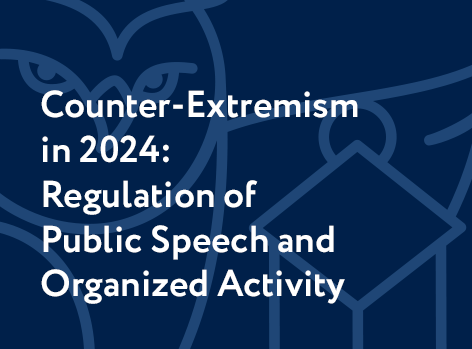The following is a review of the primary events highlighting the misuse of Russian anti-extremism law in March 2012.
Rulemaking
On March 21, the federal draft law “On Amendments to Article 22.1 of the Federal Law ‘On Governmental Registration of Legal Entities and Individual Entrepreneurs’ and to Articles 331 and 351.1 of the Labor Code of the Russian Federation” passed its second reading in the State Duma. On March 28 it was approved by the Federation Council, the upper house of Russian parliament. We remind readers that the bill provides for a ban on the employment of minors who have been convicted of a crime under Chapter 29 of the Criminal Code (Crimes against the Fundamentals of the Constitutional System and State Security, Articles 275-284). In and of itself, this measure is in line with current practices of criminal liability. However, as unjust verdicts are often brought in under articles of Chapter 29, we fear that victims of improperly applied anti-extremism law may face even greater deprivation of rights than they currently do.
Prosecution
In early March, the Moscow Prosecutor’s Office opened a criminal case under Part 3 of Article 212 of the Criminal Code, calls for rioting, against journalist and social activist Arkady Babchenko. The case was filed by head of the Orthodox faction of United Russia youth group Nashi Boris Yakemenko in light of a post on Babchenko’s blog a few days prior to a February rally For Fair Elections. It is our position that Babchenko’s text does not contain calls for action that could be considered rioting under Article 212, and the hypothetical police resistance mentioned therein appears to be more farcical than anything else.
In late March we became aware that a resident of Yuzhno-Sakhalinsk was prosecuted under Part 1 of Article 282, inciting hatred or enmity, as well as the humiliation of human dignity, on the grounds of membership in a social group. The defendant is suspected of posting an article on his Vkontakte page in summer 2011 calling for hostile actions against the police. It has long been Sova’s position that law enforcement does not require the protection of anti-extremist legislation, and should not constitute a social group under Russian legislation.
Another high-profile development in March was the case against the punk band Pussy Riot. Three members of the group suspected of involvement in a so-called punk prayer service at the Christ the Savior Cathedral in central Moscow – Nadezhda Tolokonnikova, Maria Alekhina and Ekaterina Samutsevich – were arrested and are being held until April 24 on charges related to Part 2 of Article 213 of the Criminal Code: hooliganism committed by a group of persons by prior agreement. A hate motive is implied simply by the use of Article 213, but hatred against what, whom or which group has not been specified.
In late March charges in a case were transferred to parts 1 and 2 of Article 282.2 of the Criminal Code, organization of and participation in a banned organization, against twelve members of the St. Petersburg branch of the Other Russia Party. The charges arise in allegations that the defendants participated in the activities of the banned National Bolshevik Party.
A Chelyabinsk Regional Court began a trial relating to a massacre at the Tornado music festival in August 2010, which was held in Miass, in the Chelyabinsk Region. Out of a total thirteen defendants, three are charged under Part 1 of Article 212 of the Criminal Code, organization of mass disorder, and paragraphs “A” and “V” of Part 2 of Article 282, actions aimed at inciting violent hatred or enmity by an organized group. It is Sova’s position that the use of the article for incitement of hatred is wrongfully applied, as fans of rock music can hardly be considered a separate social group requiring protection under anti-extremist legislation.
In Nizhny Novgorod, an investigation of charges under Part 2 of Article 213, hooliganism committed by a group of persons by prior conspiracy motivated by hate, was completed at the end of the month. The charges relate to the arson of the reception area of the office of United Russia legislative assembly member Vadim Zhuk. Two teenagers are charged with disorderly conduct motivated by hatred towards the social group “members of the United Russia Party.” Of course, we consider MPs of any political party to be less a social group than even fans of rock music.
Prohibition of materials for extremism
Several March court decisions refused to ban materials on extremist grounds, a development that we welcome.
In late March, Russia’s Supreme Court overturned an August 24, 2011 decision by the Naberezhnochelninsky City Court of the Republic of Tatarstan that had deemed thirteen Scientologist materials to be extremist. The case was returned to the court of first instance (the Naberezhnochelninsky) for a retrial.
Towards the end of the month, the Sakhalin Regional Court annulled an October 2011 decision by the Makarov District Court of the Sakhalin Region that had deemed a number of Jehovah’s Witnesses materials to be extremist. The case was submitted for reconsideration at the Makarov District Court.
Finally, on March 21, the Tomsk Regional Court refused to recognize the text Bhagavad Gita. As it is. as extremist. The book, which is a commentary on the major doctrinal text of Krishnaism, has been continually targeted by Russian courts. The Tomsk decision delivered a point in the right direction in a high-profile case that had resonated on an international scale.



